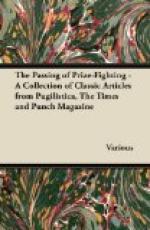There never was a dockyard Member who more faithfully fulfilled the House of Commons’ conception of the type than Sir CLEMENT KINLOCH-COOKE. In a comparatively short Parliamentary career he must have already cost the country a pretty penny in extra pay and pensions to the “mateys” and “matlows” of Devonport. Latterly he has given the Admiralty a rest and has devoted himself to strafing the Home Office for its alleged tenderness to the Conscientious Objectors lodged at Princetown—a race of sturdy beggars, according to his account, who live like fighting-cocks, do next to no work, get leave periodically to air their eloquence at pacifist meetings, and, worst of all, invade his constituency in their leisure hours. Mr. SHIRLEY BENN, who represents the neighbouring borough of Plymouth, supported this indictment, and added the amazing detail that one of the Princetown pacifists was an ex-pugilist.
[Illustration: THE CHANCELLOR OF THE EXCHEQUER LYING IN WAIT FOR A RICH PRIZE.]
Invited to select from the 670 members of the House the two men least likely to engage in personal violence I should have thought myself safe in choosing Sir GEORGE GREENWOOD and Mr. JOSEPH KING. The former is so devoted to animals that he would not turn upon a worm; the thought of bloodshed so shocks the latter that he welcomes any suggestion of peace however illusory. But, when Mr. KING described a proposal of Sir GEORGE’S as “infected with Prussianism,” that gallant knight promptly invited him to repeat his language outside the House; and Mr. KING, nothing daunted, declared his readiness “to meet the hon. Member where he likes and with whatever weapons he likes.” If the meeting had come off it is believed that Blue Books at forty yards would have been the choice; but, happily, peace was soon afterwards restored.
Tuesday, May 1st.—Some of our super-patriots have no luck. Mr. JOYNSON-HICKS, having discovered that the British Vice-Consul at Riga was a gentleman with the suspicious name of WISKEMANN, thought that he had got hold of a sure thing—not the whole Hidden Hand, perhaps, but certainly one of the phalanges. And then down came Lord ROBERT CECIL with the information that the gentleman in question was not only British-born but was a product of Wellington and Cambridge, and a public servant in whom the Foreign Office had the utmost confidence. “Foiled again,” muttered HICKS to JOYNSON, “but a time will come!”
Like the retired soap-boiler who always looked in on melting-days Lord HARCOURT could not resist the attraction of the Office of Works’ Vote. He never displayed his ability more signally than in the rapidity and ease with which he used as First Commissioner to get his Estimates through the House. It was a treat to hear him poking fun at the bores, demolishing the captious and humouring the serious critics of his administration. His present successor goes about his business in a more stolid way. In his hands the rapier has become a ploughshare.




